By Kenneth Ibe, Hadiza Mohammed, and Sunday Oko (lead writers)
Despite the many groundbreaking innovations in the treatment and prevention of HIV, it still is a death sentence for some, particularly the most vulnerable and the marginalised. Young people living with HIV/AIDS, who are part of this group, still deal with social stigma and discrimination. They deserve to live in a society free from stigma and discrimination. One in which they receive all the support and resources they need to live their lives to the fullest.
Since the discovery of the first cluster cases of the Acquired Immune Deficiency Syndrome (AIDS) over 40 years ago, HIV/AIDS has recorded multiple innovative breakthroughs. From the development of low-cost and extremely effective preventive methods such as the use of condoms during sexual intercourse to emergency antiretroviral medications and long term antiretroviral (ARTs) medications for those already infected with the disease to scientific advances in the development of an HIV vaccine that could potentially prevent new infections.
However, the 2022 UNAIDS Global AIDS update titled ‘In Danger’ revealed that global progress towards HIV prevention is slowing rather than accelerating and ‘the most vulnerable and marginalised are being hit the hardest’. The vulnerable and marginalised include people who have been disproportionately impacted by social, economic, and political challenges: women and girls, people with disabilities, children and the youth.
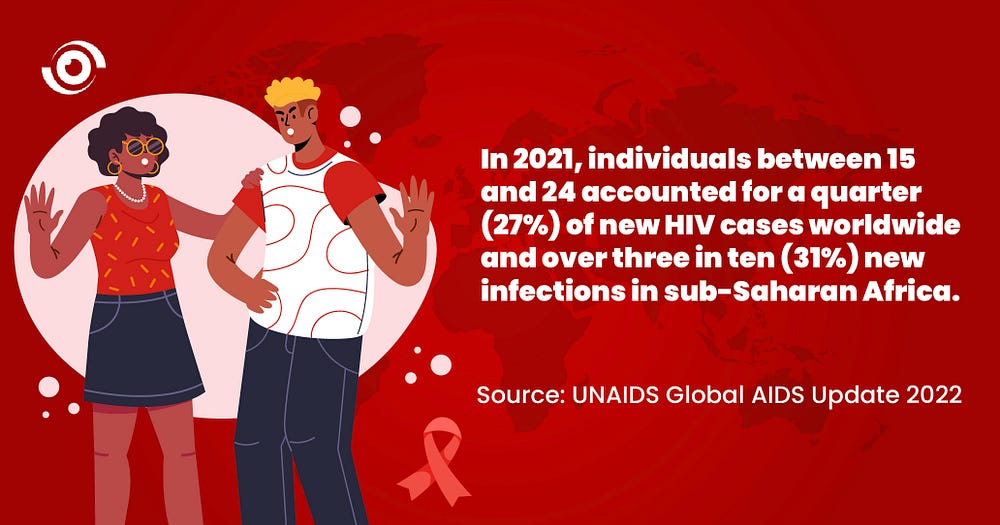
In 2021, young people between the ages of 15 and 24 accounted for more than a quarter (27%) of new HIV cases worldwide, and about three in ten (31%) of new infections in sub-Saharan Africa. Adolescent girls and young women of the same age group, one of whom becomes infected with HIV every three minutes, are three times more likely to acquire HIV than adolescent boys and young men of the same age in sub-Saharan Africa.
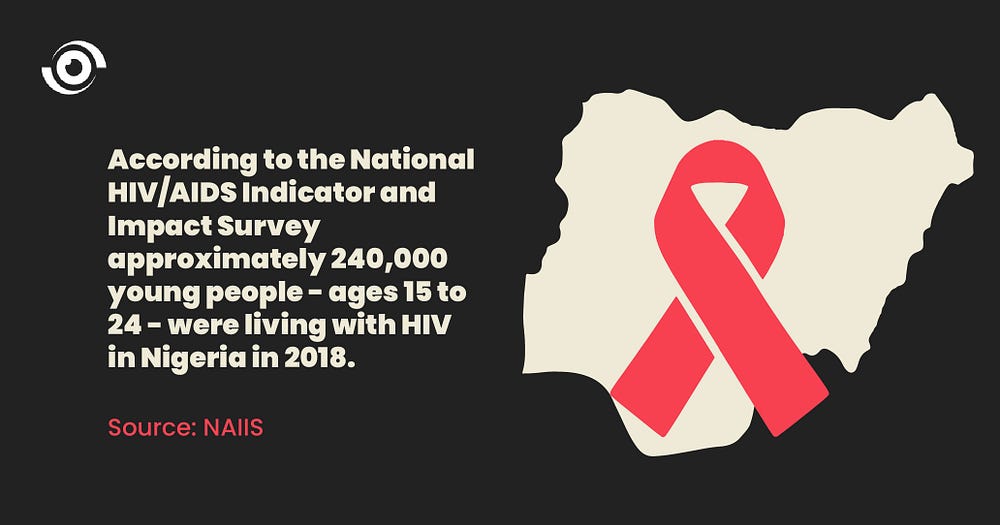
The largest HIV survey ever done, the National HIV/AIDS Indicator and Impact Survey (NAIIS) conducted in Nigeria in 2018, estimated that approximately 240,000 young people — ages 15 to 24 — were living with HIV in Nigeria in 2018.
Living with HIV in Nigeria — Young positives share their experiences
Young people living with HIV/AIDS, or young positives as they prefer to be called are faced with several unique challenges, ranging from stigma and ignorance to post-traumatic issues bordering on status disclosure. One of the most significant challenges faced by young people living with HIV/AIDS in Nigeria is social stigma and discrimination. Many people still believe that HIV/AIDS is caused by “immoral” behaviour, and this belief contributes to the stigmatisation of those living with the virus. This stigma frequently leads to discrimination in education, employment, and social relationships, making it difficult for young people to access basic services and support.
Three young individuals living with HIV in Nigeria shared their personal experiences living with the virus. Their diverse experiences provided valuable insights and the perspectives and recommendations they provided can help to improve understanding and support for people living with HIV.
Nfemi Daniel* (Young Positive)
“When I was 14 years old, I developed a persistent rash which baffled me. Believing it to be chicken pox I immediately started treatment, but found no relief. When I turned 15 years old, I fell seriously ill, requiring hospitalisation and oxygen support for eight days. The medical team conducted a series of tests, and to my horror, confirmed that I had contracted HIV.
My parents were deeply shaken and began to question me, even going so far as to subject me to a virginity test to prove my innocence. We eventually discovered that I had contracted the virus from a blood transfusion I had received when I was young.
The revelation only made things worse as I faced stigma and isolation from my own family. The weight of the situation and the discrimination I experienced left me feeling depressed and alone. However, I found support in the Association of Positive Youths in Nigeria (APYIN), where I met other young individuals facing the same plight as me.
Through my interactions with APYIN, I gained a deeper understanding of the virus and was able to educate my family about the realities of living with HIV. Despite the initial hardship and discrimination, I faced, I emerged stronger and more knowledgeable about the condition, and found solace in the community of others like me.”
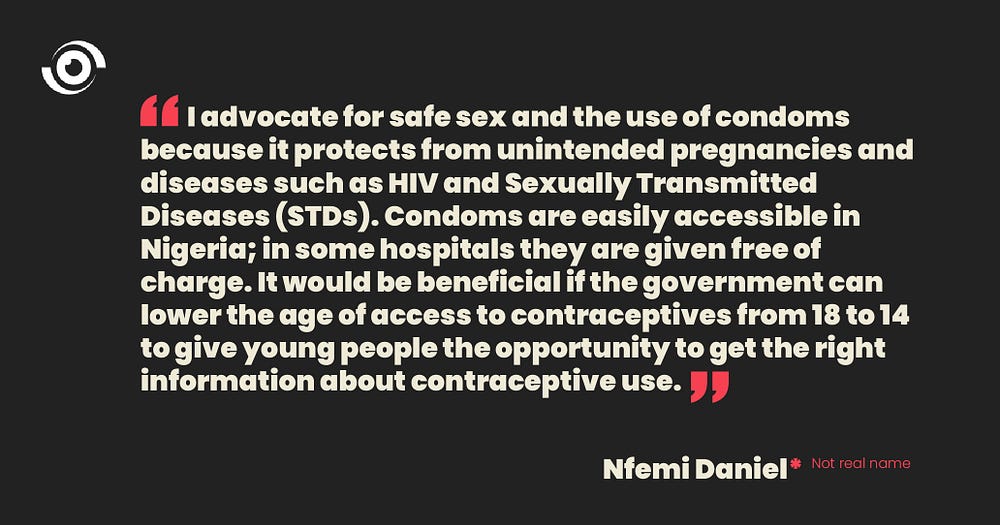
Joy Simon* (Young positive)
“As a child, I was never told about my condition. However, all that changed when a healthcare provider delivered the news in the most insensitive manner possible. I was told, ‘Take the medication, or you’ll die.’ The news left me struggling to come to terms with the weight of the diagnosis and the stark realisation that my life would never be the same.
I had so many questions. How had I contracted the virus? Why me? It was only after a series of investigations that my parents revealed the cause: a blood transfusion received during my childhood. For 22 years, I have been taking antiretroviral (ARV) drugs to manage my condition, but the journey has not been easy.
Over time, I discovered my passion for advocacy, using my experiences to educate and inspire others. Through my journey, I have learned the importance of resilience, perseverance, and the power of hope. While the road has been fraught with obstacles, I have found the strength to carry on, driven by a desire to make a difference and to help others find the same hope and resilience within themselves.”
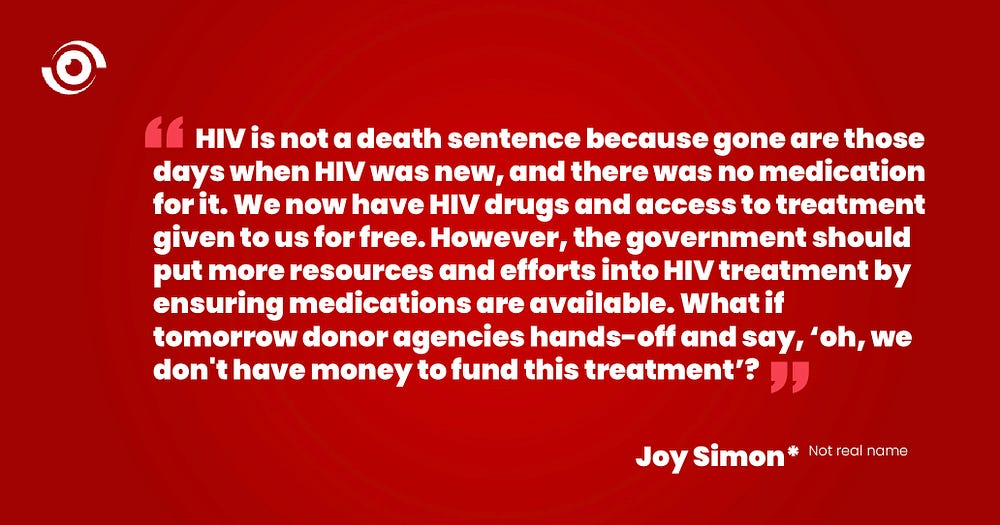
Aaron Sunday (National Coordinator of APYIN and a young positive)
I was diagnosed at age 12 and was taking medication without knowing its purpose. Eventually I got tired of the seemingly endless medication and threatened to discontinue it unless my parents revealed its purpose to me.
My experience has been both positive and negative. The negative phase was when I was newly diagnosed, and I experienced the uncertainty of my survival or if there will be a cure. That period I was diagnosed was traumatising because it affected my ability to stick to medication and to be able to adhere to the drug because of the thought of taking the medication for the rest of your life. But when I was properly informed, I embraced the risks and challenges.
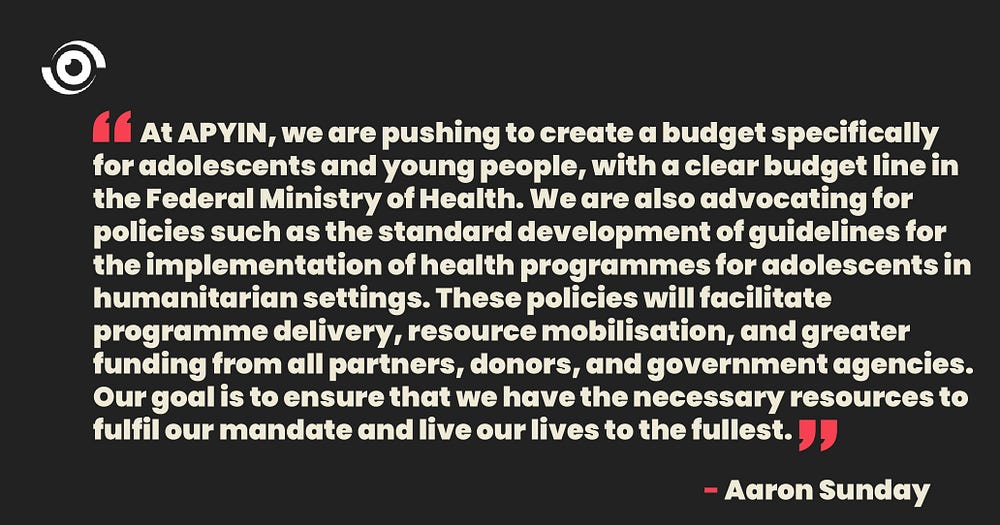
Moving forward
Nigeria’s National HIV Strategy for Adolescents and Young People was designed to provide a clear and feasible guideline for addressing HIV/AIDS in this age group, however young people are often excluded and marginalised from the implementation of these plans, which adversely affects them. As the government works to address issues related to funding, knowledge, stigma, and discrimination, it is crucial to concentrate on adolescents and young people living with HIV. These individuals require a targeted focus to ensure they receive the support and resources they need.
Youth-friendly service delivery and health services that take into account the specific issues affecting young people must be provided. Policies that work for young people living with HIV/AIDS must be created and effectively implemented to enable them to thrive. The Anti-Discrimination Act 2014 was passed into law to address offenses of stigma and discrimination and encourage a society free from HIV/AIDS stigma and discrimination. The government must ensure full implementation of this law to create an equal society for all.
To improve HIV responses, governments and donor agencies must involve young people in decision-making and prioritise youth-led organisations. This includes providing consistent funding and capacity development, as outlined in the Global AIDS Strategy and 2021 Political Declaration on AIDS. By doing so, young people can use their knowledge and creativity to shape HIV programmes that work for them and their peers.
*Not her real name


